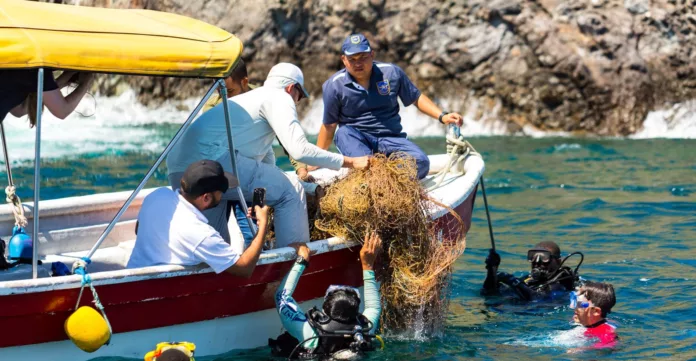
Ghost gear—also known as abandoned, lost and discarded fishing gear or ALDFG—continues to pose a significant threat to the fisheries and aquaculture sector, and it is also a major source of aquatic pollution, threatening aquatic species and environments, as well as food security both in the Caribbean and globally.
To address this problem, the Caribbean Regional Fisheries Mechanism (CRFM) and the Global Ghost Gear Initiative (GGGI) signed a Memorandum of Understanding today, Friday, 8 September 2023, as a part of their collaborative efforts to combat the growing negative impacts of ALDFG across the Caribbean. The agreement formalizes the partnership between the CRFM and GGGI which began in 2018.
The MoU—signed during the CRFM webinar on Understanding and tackling abandoned, lost, or discarded fishing gear in the Caribbean, convened earlier today as a part of the CRFM’s 20th Anniversary Technical Events Series—satisfies a mandate from CARICOM Ministers responsible for Fisheries and Aquaculture, who passed a resolution on the prevention of ALDFG in CRFM Member States, when they met in regular session in April 2023.
On that occasion, the CRFM Ministerial Council also commissioned the CRFM Secretariat to conclude this MoU with the GGGI, to further their work to address ghost fishing.
CRFM Executive Director, Milton Haughton, said: “This is a significant milestone on our journey towards the sustainable use of the region’s living marine resources and ensuring that the vast wealth lying beneath the Caribbean Sea yields optimal benefits for our present and future generations. The signing of this MoU between the CRFM and the GGGI establishes a very important partnership to enhance cooperation in raising awareness and taking appropriate action towards prevention, mitigation, and remediation measures in addressing ghost fishing in CRFM Member States. The signing of the MoU furthermore bolsters the support being provided to the 17 CRFM Member States through the GGGI.”
Mr. Joel Baziuk, Associate Director, Global Ghost Gear Initiative, said: “We are very pleased to be moving this collaboration forward with the CRFM via the signing of this MoU. With the support of the CRFM, the GGGI has been working with several Member States to address ALDFG since 2019, including Belize, Grenada, Jamaica, Montserrat, and Trinidad and Tobago. The work that the CRFM has done for fisheries sustainability across the board in the Caribbean cannot be overstated, and we are looking forward to working together more formally to tackle ALDFG throughout the region.”
The ghost gear problem—which is a global challenge—is being exacerbated in the context of climate change, ocean acidification, and marine pollution, causing increased adverse impacts on the marine environment and fish stocks.
Illegal, unreported and unregulated fishing and transnational organized crime in the fishing industry—a significant source of abandoned, lost, and otherwise discarded fishing gear—compound the problem.
However, notable advancements have already been made through the CRFM-GGGI cooperation to date.
In 2022, the CRFM collaborated with the GGGI and the Gulf and Caribbean Fisheries Institute (GCFI) to develop a Caribbean Regional Action Plan to Prevent ALDFG.
The parties also collaborated on surveys of fishers and other stakeholders, which indicated that ALDFG is widespread in the Caribbean.
Traps and nets are the most prevalent and most harmful forms of ALDFG, according to the GGGI Best Practice Framework for the Management of Fishing Gear.
The CRFM was established by Heads of Government in 2002, as an intergovernmental organization of the Caribbean Community (CARICOM), vested with the responsibility to address, promote and facilitate the development, management and conservation of fisheries in the CARICOM region through promoting the sustainable use of fisheries and aquaculture resources in and among Member States.
Established in 2015, the GGGI, led by Ocean Conservancy, is the leading global platform for addressing the problem of abandoned, lost and discarded fishing gear, and it consists of 136 participant organizations from around the world, with the official support of 20 governments, joined by the Caribbean countries which now support the initiative through the CRFM.
